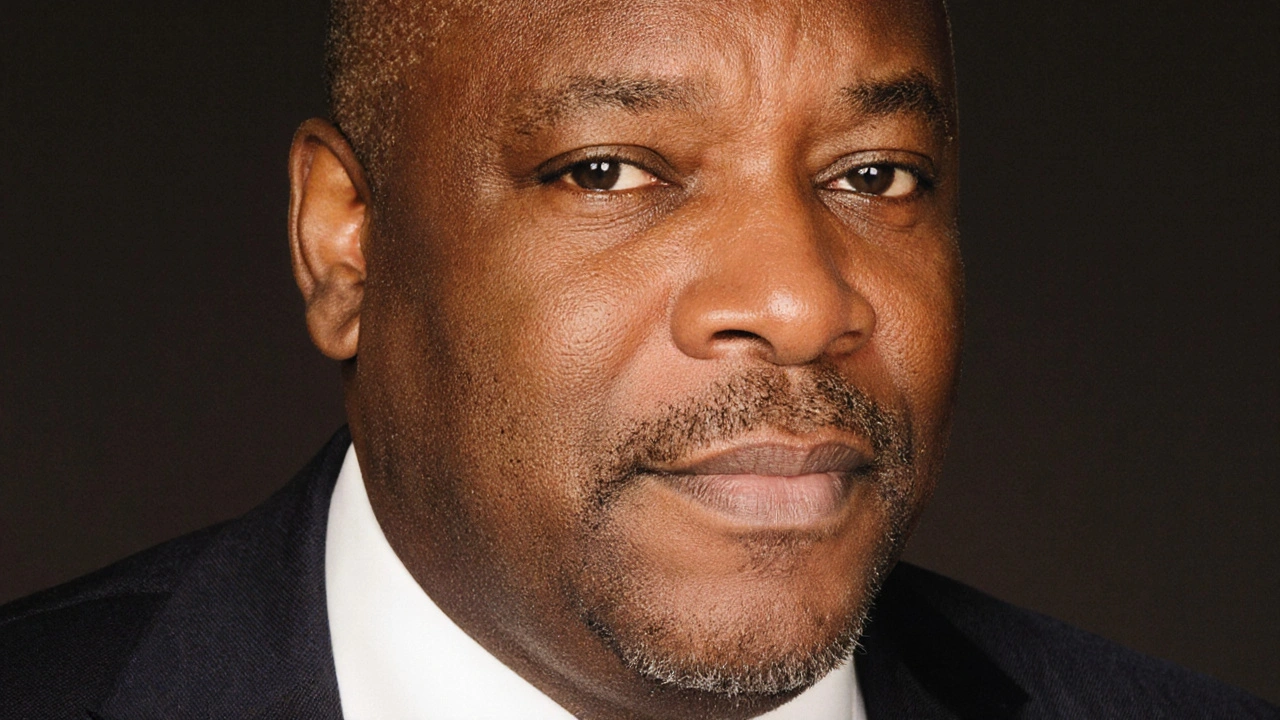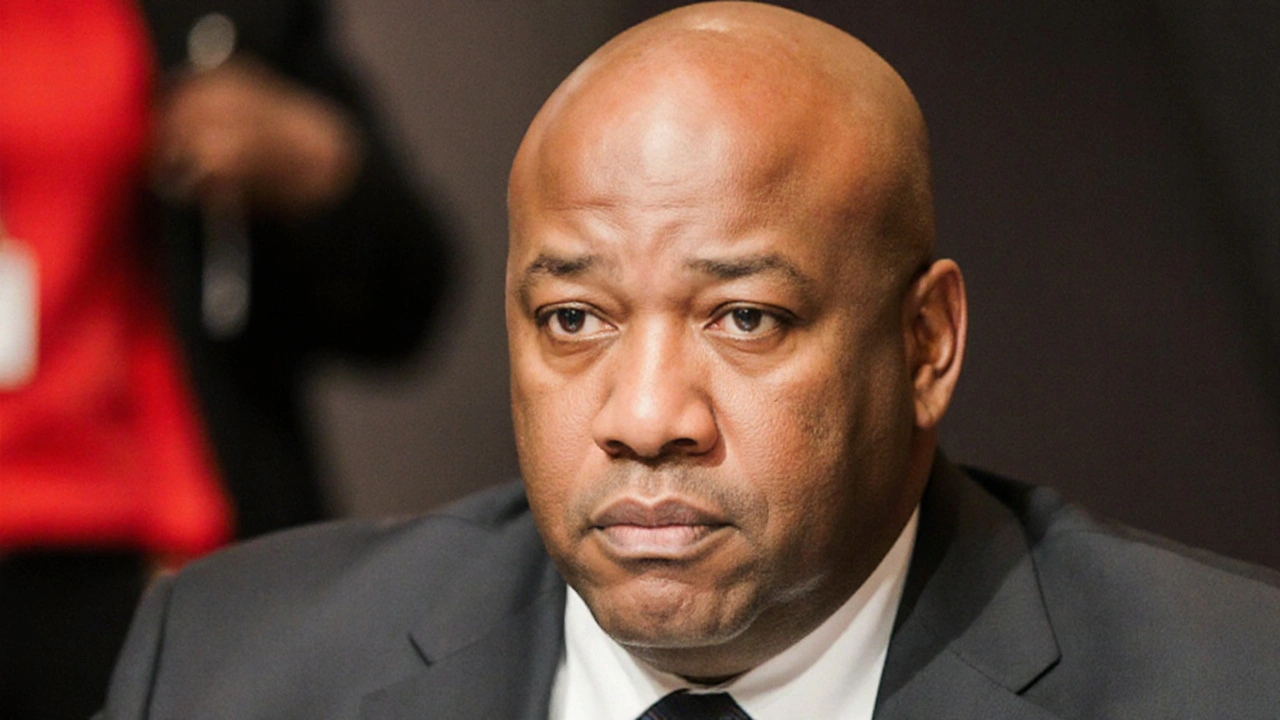The scandal trail that put McKenzie in the spotlight
Since taking the sports, arts and culture portfolio, Gayton McKenzie has been a magnet for headlines. The former 26s gang boss turned Patriotic Alliance leader has seen his past repeatedly resurfaced, turning routine ministerial duties into a public relations nightmare. In August 2025, a cache of old social‑media posts emerged, laced with apartheid‑era slurs aimed at black South Africans. ActionSA slammed the revelations and filed a complaint with the Human Rights Commission, while the EFF demanded his immediate sack.
McKenzie brushed the episode off as a smear campaign, claiming political rivals were out to “silence” his voice. Yet the incident sparked a broader debate about whether someone with such a record should occupy a high‑profile cabinet position in a democracy still healing from its apartheid legacy.
Corruption allegations added fuel to the fire. As mayor of the Central Karoo District in 2022, McKenzie organised a gala in Sandton that raised R3 million earmarked for municipal service delivery. The money never hit the municipal accounts; instead it turned up in the bank account of Eugene Botha, the Patriotic Alliance’s national head of legal affairs. Botha insisted it was a party donation, prompting the Western Cape High Court to order McKenzie and Botha’s law firm to hand over documents to investigators.
Further complications arose from alleged gang connections. A 2022 incident saw McKenzie involved in moving Eldorado Park gangster Jermaine Prim between security facilities – a move described as part of a larger gang war. In 2024, the Mail & Guardian claimed the Patriotic Alliance was receiving funding from the daughter of the slain 27s boss William "Red" Stevens, a claim McKenzie has consistently denied.

How the GNU is testing its limits
The Patriotic Alliance’s latest threat – to pull out of the Government of National Unity (GNU) – could upend the delicate balance that has held the ANC‑led coalition together since the 2019 elections. In September 2025, McKenzie announced his party would exit the GNU, accusing coalition partners of disrespect and accusing the ANC of sidelining his deputy, Kenny Kunene, from the Johannesburg mayoral committee.
This move would be more than a symbolic gesture. The GNU relies on smaller parties like the Patriotic Alliance to provide a parliamentary majority and to project an image of inclusive governance. Losing the PA could force the ANC to forge new alliances, possibly with the main opposition – the Democratic Alliance – a partnership that seems contradictory given their historical rivalry.
Political analysts point out that the timing is no accident. The dispute over Kunene’s removal coincides with mounting friction over policy priorities, budget allocations, and the distribution of key ministries. McKenzie’s claim that the ANC is waging a "silent war" against his party underscores a deeper mistrust that has been simmering since the coalition’s inception.
Beyond the immediate power‑play, the controversy raises questions about the very idea of a national unity government in a country as polarized as South Africa. When parties with wildly different ideologies – from the left‑leaning Economic Freedom Fighters to the centrist Democratic Alliance, and now a party led by a former gang leader – are forced to share a governing platform, conflict is almost inevitable.
Supporters of McKenzie argue that his hands‑on approach as minister – regularly attending cultural events, pushing for sports development in under‑served townships, and championing youth arts programmes – demonstrates that he brings more than controversy to the table. They cite tangible outcomes, such as increased funding for rural arts festivals and a modest rise in sports facility upgrades.
Critics, however, warn that any short‑term gains are outweighed by the long‑term damage to institutional credibility. They point to the erosion of public trust when a cabinet member’s personal history repeatedly becomes a headline, especially when that history includes violent crime and alleged financial misconduct.
As the GNU navigates this turbulence, the stakes extend beyond party politics. South Africa’s economy, still wrestling with high unemployment and sluggish growth, depends on stable governance to attract investment. Continued infighting could deter foreign investors and exacerbate fiscal pressures already felt across the nation.
Meanwhile, civil society groups are monitoring the situation closely. Several NGOs have called for an independent parliamentary inquiry into the missing R3 million and the alleged gang funding, urging the parliament to enforce stricter vetting standards for cabinet appointments.
The next few weeks will likely reveal whether McKenzie’s threat is a strategic bargaining chip or a genuine move toward an exit. If the Patriotic Alliance does pull out, the GNU will have to confront a harsh reality: a coalition built on compromise may not survive when the underlying mistrust becomes too great to bridge.

10 Comments
Nilanjan Banerjee September 27 2025
The appointment of a former gang figure to a ministerial post constitutes an affront to the very ethos of democratic rejuvenation. South Africa's post‑apartheid trajectory demands custodians of public trust who embody rectitude. Yet the corridors of power have been infiltrated by individuals whose histories are riddled with moral ambiguities. The revelation of antiquated slurs serves not merely as a scandal, but as a lachrymose reminder of lingering specters of intolerance. When a leader brushes such transgressions aside as “smears,” it underscores a troubling disengagement from accountability. Moreover, the misappropriation of R3 million destined for municipal services betrays an egregious breach of fiduciary duty. The diversion of those funds into private accounts erodes the social contract upon which citizens rely. In a fragile coalition, the integrity of each participant is paramount to sustaining governance. The Patriotic Alliance's threat to abandon the GNU jeopardizes the delicate balance that steadies the nation. Should the ANC be compelled to seek an alliance with the Democratic Alliance, the historical antagonism may exacerbate polarization. It is imperative to recognize that political expediency cannot eclipse ethical imperatives. The electorate deserves leaders who prioritize collective advancement over personal aggrandizement. A nation grappling with unemployment and stagnant growth cannot afford internal discord. The specter of foreign investors fleeing in response to instability is a concrete risk. Ultimately, the preservation of South Africa's democratic promise hinges upon steadfast adherence to principle and transparency.
sri surahno September 29 2025
The narrative presented in mainstream outlets conveniently omits the machinations of shadowy financiers who profit from division. It is evident that the Patriotic Alliance serves as a pawn in a larger design orchestrated by elite cabals. The timing of the GNU withdrawal aligns suspiciously with undisclosed offshore transactions. One must question whether the alleged gang connections are merely a façade to mask deeper infiltration. Moral integrity cannot be compartmentalized; it demands unwavering vigilance. Citizens are being lured into a false dichotomy that pits accountability against progress. The ethical erosion displayed by the ministerial elite is a symptom of systemic decay. It is incumbent upon civil society to expose these conspiracies before the fabric of democracy unravels.
Varun Kumar October 1 2025
This is another ploy by foreign interests to weaken South African sovereignty. The so‑called “corruption” scandal is fabricated to distract from true nationalist priorities. The nation must stand firm and reject the GNU's treacherous agenda.
Madhu Murthi October 3 2025
The whole saga feels like a reality TV script, complete with betrayals and drama. Yet the real impact on township sports programs is lost amid the sensationalism. While the minister touts cultural successes, the underlying fiscal mismanagement persists. One cannot ignore the pattern of using public office as a stage for personal theatrics. The nation deserves leadership that prioritizes substance over spectacle 🙂.
Amrinder Kahlon October 5 2025
Sure, because pulling out of a unity government always solves everything.
Abhay patil October 7 2025
Let's focus on what we can change today. Transparent vetting processes will rebuild trust. Communities thrive when leaders are held accountable. A united front against corruption strengthens democracy. Every citizen has a role in demanding integrity. Together we can steer South Africa toward a brighter future.
Amber Brewer October 9 2025
According to the Public Service Act, any minister must undergo a rigorous background check before appointment. The recent allegations against Mr. McKenzie highlight gaps in the current vetting framework. A parliamentary inquiry could compel the disclosure of financial records related to the R3 million. Independent auditors would add credibility to the investigation. Strengthening the vetting process would help prevent similar controversies in the future. It is advisable for coalition partners to request a formal review to ensure compliance with ethical standards.
Kim Coulter October 11 2025
The state of a nation is reflected in the moral fiber of its leaders. When that fiber is frayed by personal ambition, the entire tapestry unravels. Patriotism demands that we hold our officials to the highest standards of honor. Yet patriotism also requires pragmatic governance that does not sacrifice stability for ideology. The GNU, flawed as it may be, offers a platform for inclusive policy making. Abandoning it without a clear alternative risks plunging the country into political void. Therefore, a measured approach that combines principled integrity with strategic compromise is essential.
Michelle Toale-Burke October 13 2025
I just feel my heart sink every time I read about yet another betrayal 😢. The people suffering in townships deserve more than scandal headlines 😡. It's exhausting to watch leaders play political chess with our futures 😞. We need real compassion, not performative philanthropy 😭. Hope remains only if we stand together and demand accountability 😊.
Amy Paradise October 15 2025
Hey folks, great discussion happening here! 😊. To summarize, the core issues revolve around ethical vetting, fiscal transparency, and coalition stability. The allegations of misappropriated funds warrant a thorough parliamentary inquiry. Strengthening background checks for ministers would address the root of many concerns. Maintaining the GNU could provide a buffer against extreme polarization while reforms are enacted. However, any party considering exit must weigh the economic fallout for investors. Civil society groups play a crucial role in monitoring and advocating for accountability. Let’s keep the conversation constructive and push for concrete solutions! 🙌.